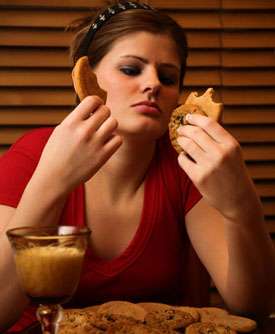When we view food as "bad,'' we're more likely to overeat, says Rutgers psychologist Charlotte Markey. Credit: Stock Photo
Thanksgiving ushers in the long season of holiday treats. While many look forward to gobs of stuffing and plates piled high with cookies, others view the smorgasbords with dread. For them, holiday eating means blown diets, expanding waistlines and a lingering sense of guilt. Rutgers-Camden psychologist Charlotte Markey studies America's conflicted relationship with food and how eating habits are shaped by family and cultural norms. She talked to Rutgers Today about the key to avoiding holiday overindulgence and the futility of dieting.
Rutgers Today: What's the best way for people to prevent holiday bingeing?
Markey: So much of what we know from research is that when people try to restrain themselves – if they approach the holiday saying, "I can't have dessert" – they're setting themselves up for failure. Those who just say, 'I'm going to enjoy myself" do much better. When something becomes forbidden and "bad,'' that's when overindulgence sets in. One of the predictors of overeating and obesity is a history of dieting. So those with concerns about their weight, when they feel free to indulge, they're going to do it. Also, eating can be a coping mechanism. When you're stressed out and shopping for presents until late at night, one way to approach things is just to accept that you're going to eat because it's a comfort right now and January will be different.
Rutgers Today: Why do Americans have such a troubled relationship with food?
Markey: We have a hard time because we have such easy access to food. The worst food for us is cheap, available and palatable and it can be hard to stay away from it. And the portions are so big. As a society, we think bigger is better: bigger cars, bigger homes. And that attitude has shifted to our waistlines. At the same time, the diet industry is awash with products that don't work long term. It's selling false hope. People think that dieting is a cure and it's not. What's really the cure is adopting a healthy, moderate lifestyle, and that includes indulging a little bit over the holidays.
Rutgers Today: What can help us have a more balanced attitude toward eating?
Markey: Try not to view food as bad but as something good and healthy. Just say, this tastes good and it's something that brings me pleasure and I'm going to savor it and enjoy it. For some people, this is a radical idea. A lot of us don't know how to do that because there are so many mixed messages about food being bad. But food isn't like a drug that when it's harmful, you can avoid it entirely. We need it to live. Food is a source of nutrition and we have to deal with it every day. If food becomes more a source of distress than enjoyment, seeing a nutritionist or a therapist can be helpful.
Rutgers Today: What are some practical tips for eating moderately during the holidays?
Markey: It's useful to look for social support if you know overeating is going to be a problem. Enlist a family member or friend. Tell them "I'm really trying to be healthy, please help me not eat this whole pumpkin pie." Another thing that can be helpful is to record what you eat, not constantly because then it becomes a preoccupation, but if you're concerned about a holiday triggering overindulgence, it can help sometimes. When you see it on paper, you tend to eat less.
It's also important to have a plan about how you're going to approach food over the holiday season, whether you're going to just not worry about it or exercise a little bit more. You don't want to be hit with this onslaught of food when you're routine is changed and you haven't thought about it in advance
Provided by Rutgers University



















